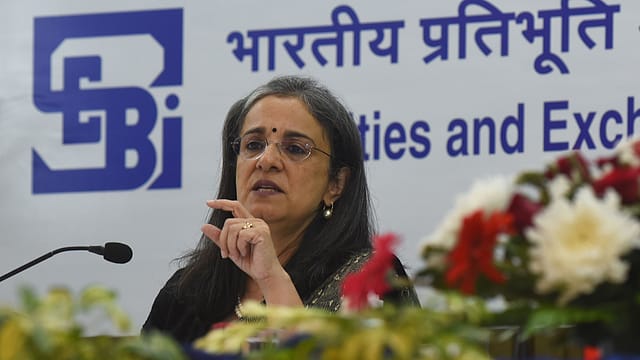SEBI chief flags manipulation in SME segment
ADVERTISEMENT

Madhabi Puri Buch, chairperson of the Securities and Exchange Board of India, on Monday, flagged potential manipulation in the small and medium enterprises (SME) segment of the capital markets.
There are signs of manipulation in the SME segment, Buch says at an event organised by the Association of Mutual Funds in India (AMFI).
This comes at a time when SEBI is examining an issue in the SME segment of NSE wherein it was observed that certain entities placed huge bids under HNI (high networth individual) category and subsequently also placed bids under the retail category. This resulted in the issue being oversubscribed but the bids were rejected as multiple applications were made from the same PAN.
SEBI chairperson says the regulator is trying to construct a case in a "robust manner". "The first step is some more disclosures in terms of risk factors for investors to understand that the SME segment is different from mainboard, the regulations are different and the risk is different," says Buch.
"There are pockets of froth in the market, some call it a bubble. It may not be appropriate to allow that bubble to keep building because when it bursts, they impact investors adversely. What should the industry do to not keep fuelling the bubble—mutual fund trustees should formulate a policy to manage this risk," says Buch.
Of late, stock exchanges have imposed additional surveillance mechanism for SME stocks.
Meanwhile, India's capital markets regulator today introduced additional compliance and monitoring requirements of stockbrokers. To designate a stockbroker as a qualified stockbroker (QSB) on an annual basis, SEBI had earlier stated four parameters: the total number of active clients, the available total assets of clients, trading volumes and end-of-day margin obligations. Based on these parameters, the initial list of QSBs was released by stock exchanges on March 3, 2023.
To further protect the interest of investors and for building trust in the securities market, SEBI has decided to extend the framework of QSBs to more stockbrokers. The revised list of QSBs will be calculated by considering the following parameters, in addition to above mentioned four parameters.
The revised list of QSBs will now consider additional parameters, including the compliance score of the stockbroker, grievance redressal score and proprietary trading volumes, according to a release.
To strengthen the compliance culture among stockbrokers and thereby, encourage stockbrokers to follow the enhanced obligations and responsibilities, SEBI has decided to facilitate stockbrokers to voluntarily get designated as QSBs, who otherwise would not have qualified to become QSBs. These provisions will come into force in a risk-based, staggered manner to ensure smooth adoption and effective implementation for all the QSBs, says SEBI.